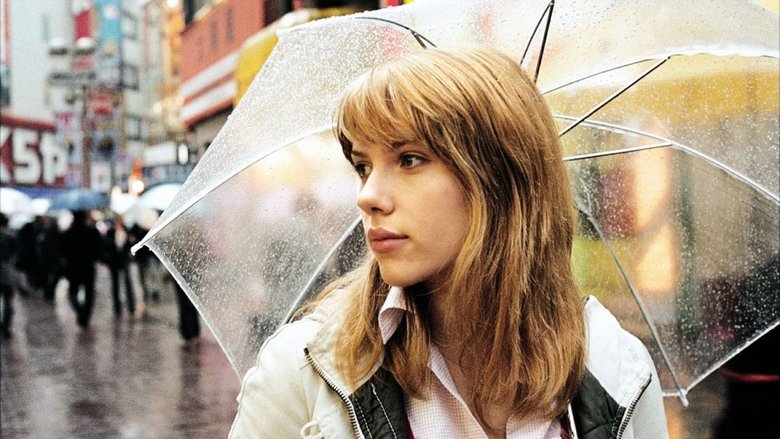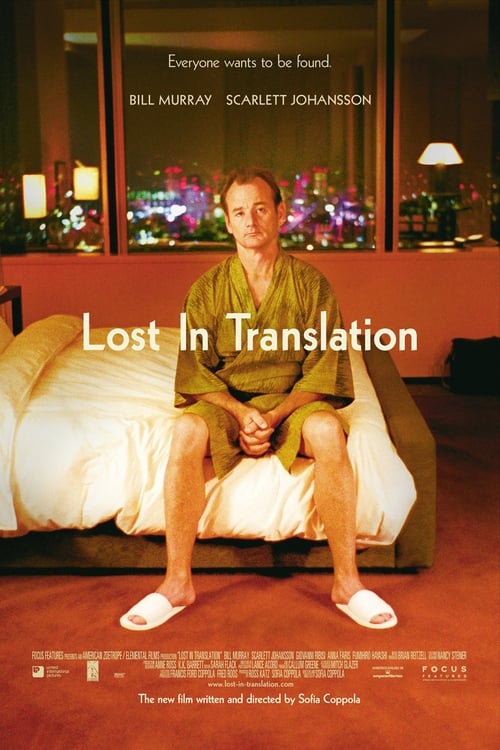← Back to Reviews

in
Lost in Translation
(2003) - Directed by Sofia Coppola
--------------------------------------------
Drama / Romance
-------------------------------------------------
(2003) - Directed by Sofia Coppola
--------------------------------------------
Drama / Romance
-------------------------------------------------
"The more you know who you are, and what you want, the less you let things upset you."


As a major Francis Ford Coppola nut who even gave five-stars to Tetro, Dracula and Godfather Coda, I pretty much have to see how his daughter is doing as a director. Maybe she wasn't the best actor when she played Mary in Coda, but I don't ever blame a person for wanting to be like their parent. I admit I have trouble bringing myself to The Virgin Suicides because of its subject matter, as movies dealing with religious fanatics tend to piss me off. But I have to get to that and Lost in Translation. Since it's end-of-the-month streaming time, due to movie switches between months, Lost in Translation it is.
Bob Harris is an actor making his way towards "washed up," doing Japanese commercials instead of movies. Charlotte doesn't feel related to her husband at all, and finds it all to be mundane. The two stay at the same hotel and eventually connect, relating to each other in ways that eventually leads into a more vibrant romance than what they have with their spouses.
I find this movies directorial and writing decisions to be somewhere between Yasujiro Ozu's Late Spring and Richard Linklater's Before Sunrise. It's a romance that largely revolves around two people's constant encounters with each other, and their developing relationship, largely stemming from their own loneliness, and whatever activities happen around the lives of these two are properly represented as mundane and lifeless, artistically so. How? Simple.
These scenarios will either allow you to relate to the present protagonist's problems are maybe make you laugh a little. So as the movie progresses, it's much more fun to see Bob and Charlotte together. So the directorial decisions are reminiscent of Late Spring and Before Sunrise because of its reliance on two people's connection and the lacking relevance of the surroundings to the plot. Still, I believe the activity of their appointments and jobs helped us look into the reasons why there lives feel so mundane, so it feels like a more complete story than Late Spring, but because it also draws out a little, this pro / con hybrid of mundane experiences also requires some of the Linklater touch to really feel phenomenal. Still, it's a very heartwarming one with a romantic dynamic with heavy power expressed through light sentiment. This effect seems to be created by challenging the mundane experiences we live through. In other words, this is an art-romance.
The only question remaining is: do they GENIUNELY love each other, or do they feel that desperate because they relate to each other much more than they do with their own families? When I think about it that way, I kinda love the ambiguity. Well, one would really like to believe it's real, considering that Johannson and Murray have incredible charisma through their subtle acting. You can just feel their struggle not to mention that they're falling for each other.
Maybe I'm wrong, but I think some of these scenes, like the one involving the woman in Bob's room, might be a little offensive towards Japan as the cultural misunderstandings might paint an offbeat picture of their modern culture. But I'll let the Japanese decide on that one. Personally, I don't really think it's going to lower any morale expectations I have for Japan, when I believe every country has its pros and cons and am too bothered by some problems in America to voice major opinions about Japan. For now, I'll just say that whole I could predict some of the humor and kind of seen some of it before on Nickelodeon, some of these outlandish scenes were very entertaining, and I still want to visit Japan for all reasons I wanted to before watching Lost in Translation.
So Lost in Translation's purpose was to experience the mundane and the main characters' emotional responses toward it, and finally find solace in relation to another person, blossoming into a forbidden romance. Was anything neglected or sacrificed to meet this goal? There are two things I can think of: the total length of the mundane scenes, considering that we can easily get the message halfway through the total runtime, and the comedy only being somewhat funny. I mean, great comedy can be mingled with drama, hence The Fisher King's brilliance in that balance between the two. The movie's vibrant and colorful world cannot compensate for the human condition, and Lost in Translation is a subtly effective reminder of that.
I'm really glad I saw this movie. It's gonna help a lot with a personal project of mine.
= 88
Sofia Coppola needs 2 more movies for a Directorial Score.
Bob Harris is an actor making his way towards "washed up," doing Japanese commercials instead of movies. Charlotte doesn't feel related to her husband at all, and finds it all to be mundane. The two stay at the same hotel and eventually connect, relating to each other in ways that eventually leads into a more vibrant romance than what they have with their spouses.
I find this movies directorial and writing decisions to be somewhere between Yasujiro Ozu's Late Spring and Richard Linklater's Before Sunrise. It's a romance that largely revolves around two people's constant encounters with each other, and their developing relationship, largely stemming from their own loneliness, and whatever activities happen around the lives of these two are properly represented as mundane and lifeless, artistically so. How? Simple.
These scenarios will either allow you to relate to the present protagonist's problems are maybe make you laugh a little. So as the movie progresses, it's much more fun to see Bob and Charlotte together. So the directorial decisions are reminiscent of Late Spring and Before Sunrise because of its reliance on two people's connection and the lacking relevance of the surroundings to the plot. Still, I believe the activity of their appointments and jobs helped us look into the reasons why there lives feel so mundane, so it feels like a more complete story than Late Spring, but because it also draws out a little, this pro / con hybrid of mundane experiences also requires some of the Linklater touch to really feel phenomenal. Still, it's a very heartwarming one with a romantic dynamic with heavy power expressed through light sentiment. This effect seems to be created by challenging the mundane experiences we live through. In other words, this is an art-romance.
The only question remaining is: do they GENIUNELY love each other, or do they feel that desperate because they relate to each other much more than they do with their own families? When I think about it that way, I kinda love the ambiguity. Well, one would really like to believe it's real, considering that Johannson and Murray have incredible charisma through their subtle acting. You can just feel their struggle not to mention that they're falling for each other.
Maybe I'm wrong, but I think some of these scenes, like the one involving the woman in Bob's room, might be a little offensive towards Japan as the cultural misunderstandings might paint an offbeat picture of their modern culture. But I'll let the Japanese decide on that one. Personally, I don't really think it's going to lower any morale expectations I have for Japan, when I believe every country has its pros and cons and am too bothered by some problems in America to voice major opinions about Japan. For now, I'll just say that whole I could predict some of the humor and kind of seen some of it before on Nickelodeon, some of these outlandish scenes were very entertaining, and I still want to visit Japan for all reasons I wanted to before watching Lost in Translation.
So Lost in Translation's purpose was to experience the mundane and the main characters' emotional responses toward it, and finally find solace in relation to another person, blossoming into a forbidden romance. Was anything neglected or sacrificed to meet this goal? There are two things I can think of: the total length of the mundane scenes, considering that we can easily get the message halfway through the total runtime, and the comedy only being somewhat funny. I mean, great comedy can be mingled with drama, hence The Fisher King's brilliance in that balance between the two. The movie's vibrant and colorful world cannot compensate for the human condition, and Lost in Translation is a subtly effective reminder of that.
I'm really glad I saw this movie. It's gonna help a lot with a personal project of mine.
= 88
Sofia Coppola needs 2 more movies for a Directorial Score.
